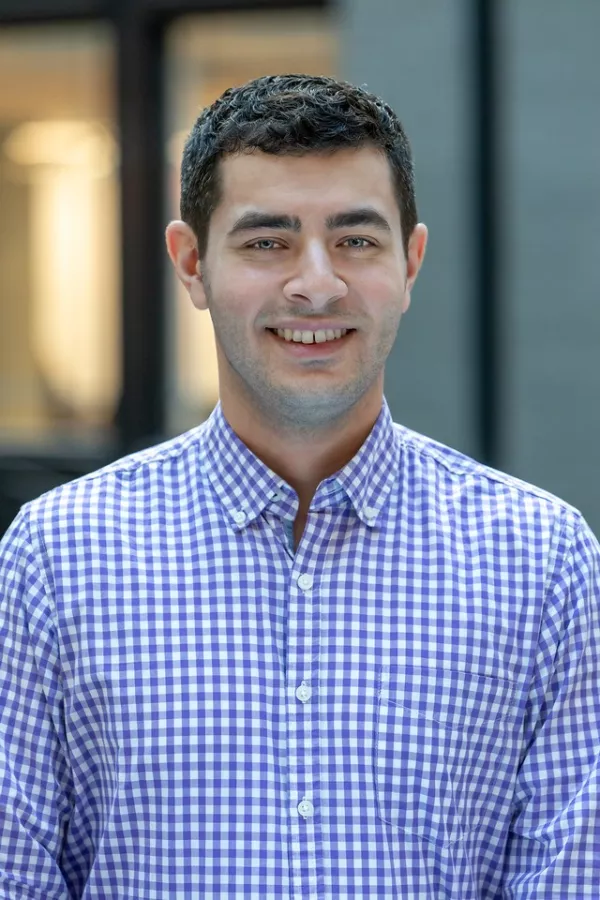Fellow Spotlight: Meet Joshua Petimar, ScD


Meet Joshua Petimar, ScD, a research fellow working with Jason Block to evaluate the effects of public health nutrition policies on diet quality. Dr. Petimar received his joint doctorate in Nutrition and Epidemiology from the Harvard T.H. Chan School of Public Health, where he previously studied relationships between diet, obesity, and cancer.
His current work primarily uses sales data from food retailers and longitudinal data from large cohort studies to investigate research questions related to calorie labeling, nutrition assistance programs, and effects of the food environment on diet and health. He pursues answers to these policy-relevant questions using natural experiments and epidemiologic methods for causal inference.
In this Spotlight, Dr. Petimar describes how being open to a new opportunity allowed him to expand his skillset and enter a different, exciting area of research; the importance of drawing inspiration from friends and colleagues; and more.
Q: Tell us about your path to becoming a post-doctoral fellow at DPM. What was your journey like?
A: I was finishing up my last year of my doctorate and was struggling to figure out what my next steps should be. For my doctoral thesis, I examined how specific dietary patterns are associated with risk of chronic disease (for example, does adhering to the Mediterranean Diet reduce your risk of colon cancer?). I liked the work I was doing, but I wanted to expand into areas more directly related to policies/interventions that could improve people’s eating behaviors and overall diets. I was just chatting about this to one of my friends in the Nutrition department one day, and she told me that she worked with this researcher at DPM, Jason Block, who was just about to start this big project on calorie menu labeling in retail settings, and that he was probably going to need a postdoc for this work. Jason and I met soon after, where he filled me in on some of the big research questions he was hoping to answer with this project. After weighing my options, it became clear that this opportunity was special – it would expose me to a different and exciting area of research and give me the chance to work with some unique and very cool data that would expand my skillset in the ways I wanted.
Figuring out what to do after getting a doctorate is hard, but I guess the moral of this story is that you should talk it out with your friends/colleagues, because you never know what opportunities might be within arm’s reach.
Q: What kind of research do you do? What sort of impact do you hope that it will make?
A: A central theme in my work is investigating nutrition policies that aim to improve diet quality for chronic disease prevention. This means evaluating whether existing policies (such as calorie labeling) are effective in getting people to make healthier food decisions, as well as exploring how they can be strengthened to achieve better and more equitable outcomes. Most of the work I do involves policies in retail settings, including those enforced through legislation, as well as those implemented voluntarily by large food retailers. My overall goal is to make sure that the research I do can be translated into specific and actionable policy changes. When thinking about taking on a new project I try to ask myself: “if we knew the answer to this research question, what difference would it make?” I’ve tried to focus my efforts on projects that can answer that question with a really specific policy lever or action plan to improve food systems. It’s been a really helpful strategy to make sure the work I do maximizes public health impact.
My overall goal is to make sure that the research I do can be translated into specific and actionable policy changes. When thinking about taking on a new project I try to ask myself: 'if we knew the answer to this research question, what difference would it make?'
Q: Tell us about your fellowship project(s). What inspired this/these project(s)? How will these projects help you meet your career goals?
A: I’ve worked in a few areas, but most of my time as a fellow has focused on calorie menu labeling. This is a policy that requires chain retailers (restaurants, supermarkets, etc.) to include the calorie counts on ready-to-eat prepared foods. My work seeks to determine whether consumers make healthier decisions after labeling is put in place, as well as identify potential disparities in the effectiveness of this policy. Over the past year I have also done a lot of work on beverage taxes. Specifically, in 2017, Philadelphia implemented a tax on sugary and artificially-sweetened beverages, and my work investigates whether this tax has incentivized consumers to make healthier decisions when shopping in large retailers.
For both of these research areas, I work with sales data from chain restaurants, supermarkets, pharmacies, and other retailers, and leverage natural experiment designs that improve our ability to answer these questions accurately. This has been a great learning process for me, as it’s really expanded my subject matter expertise in nutrition policies as well as my methodological expertise in using large datasets and causal inference techniques to answer policy-relevant questions.
Q: Which Institute faculty member(s) are you working with? How did you come to meet them?
A: I work primarily with Jason Block, who I was introduced to by a friend. From our first meeting, Jason was great at explaining the projects he was working on and was willing to share materials that outlined how he was planning to execute his research plan. This made it really easy for me to see the big picture, including the impact that my work would have if I chose to do a postdoc with him. He’s also been great at supporting other ideas I have (including helping me write some of my first grant applications), which is such an important quality in a postdoc mentor.
I’ve also been lucky to work with other Institute faculty, mainly Emily Oken and Peter James in CoRAL, who have also been nothing but supportive of my goals and research trajectory. I was introduced to each of them just through mutual interests, and have been lucky to be able to work on some projects with them that have helped me expand my research interests even more.
Q: What advice do you have for those interested in pursuing a doctorate, or who are in the early stages of a doctoral program? What are some resources that might be helpful?
A: First, be open to new areas of research, particularly if they allow you to cultivate new skills or partnerships. Nearly everyone enters a doctoral program with some idea of what they want to do, and it’s tempting to try to specialize immediately, but I think there’s real value in experimenting with different areas and in learning new methods. And there’s really no better time to do that than in your doctoral studies.
Second, view your dissertation as an opportunity to learn new methods and gain expertise, not as a marker of your identity. Some doctoral students feel this strong need to pick the “right” dissertation, and they put a tremendous amount of pressure on themselves in the process. The truth is, your dissertation is your chance to do research in an area you’re interested in while also gaining some really valuable skills that you can showcase to future employers (including those who may want to hire you as a postdoc). You don’t have to bend the whole word with your thesis; no one expects you to. If you get the right skills and foster the right connections, that will pay off most for your future career.
Third, draw inspiration from your friends and colleagues, but don’t let it eat at you. This one’s easier said than done because it’s so natural and tempting to look at what others are doing and judge yourself unkindly because you’re not doing those same things. It sounds trite but everyone really does have their own path, and if you’re constantly judging yourself by what others do, you might miss out on what is important to you. Or you might take on too much to try to “keep up”, which can be counterproductive. What’s helped me get over this is to look at the friends/colleagues I admire and think about what habits they have that allow them to succeed. If you can change your self-talk from “I’m not as good as this person” to “what can I learn from this person”, you’ll be happier and healthier and, ultimately, more successful. Also, try to keep in mind that life is long (despite what they say). You have plenty of time to do great things! You don’t have to get them all done during your doctoral studies.
If you can change your self-talk from 'I’m not as good as this person' to 'what can I learn from this person', you’ll be happier and healthier and, ultimately, more successful.
My last piece of advice is to learn when to say no, either to others or to yourself. There are lots of demands on you as a doctoral student, and it’s tempting to want to do it all – take classes, do research, teach, serve on committees, etc. It’s really important to know how to set limits that allow you to meet your highest priority goals, while also maintaining your health, relationships, hobbies, and everything else that makes you whole. You will not be able to do it all, but you will be able to do the things that are most important for your future career. If building a strong research portfolio is the most important thing to you (as it is to many students), keep that in the forefront of your mind and build your daily routine around it to make sure it stays at the top of your list (to the extent that you can). And then when pressure comes to take on new roles or projects, try to be realistic about the commitment they require, and place them in the greater context of your trajectory to determine how they will benefit your future career. This one is also easier said than done, and definitely takes practice to get right. But in my experience, if you get comfortable with saying no when you need to, it will really help keep your eye on the prize.
Q: What is something interesting about you that your colleagues may not know?
A: When I was in my last year of college I thought about going to graduate school for English literature – reading has always been one of my favorite hobbies and something I loved studying in school. In the end I chose public health because I also really like math and science, and because it was a field where I felt I could do applied work to improve people’s health and well-being. But I still love reading and am glad I’ve been able to maintain it as a hobby!
Dr. Petimar's Bio | Learn more about CoRAL | Dr. Petimar's work In the Media